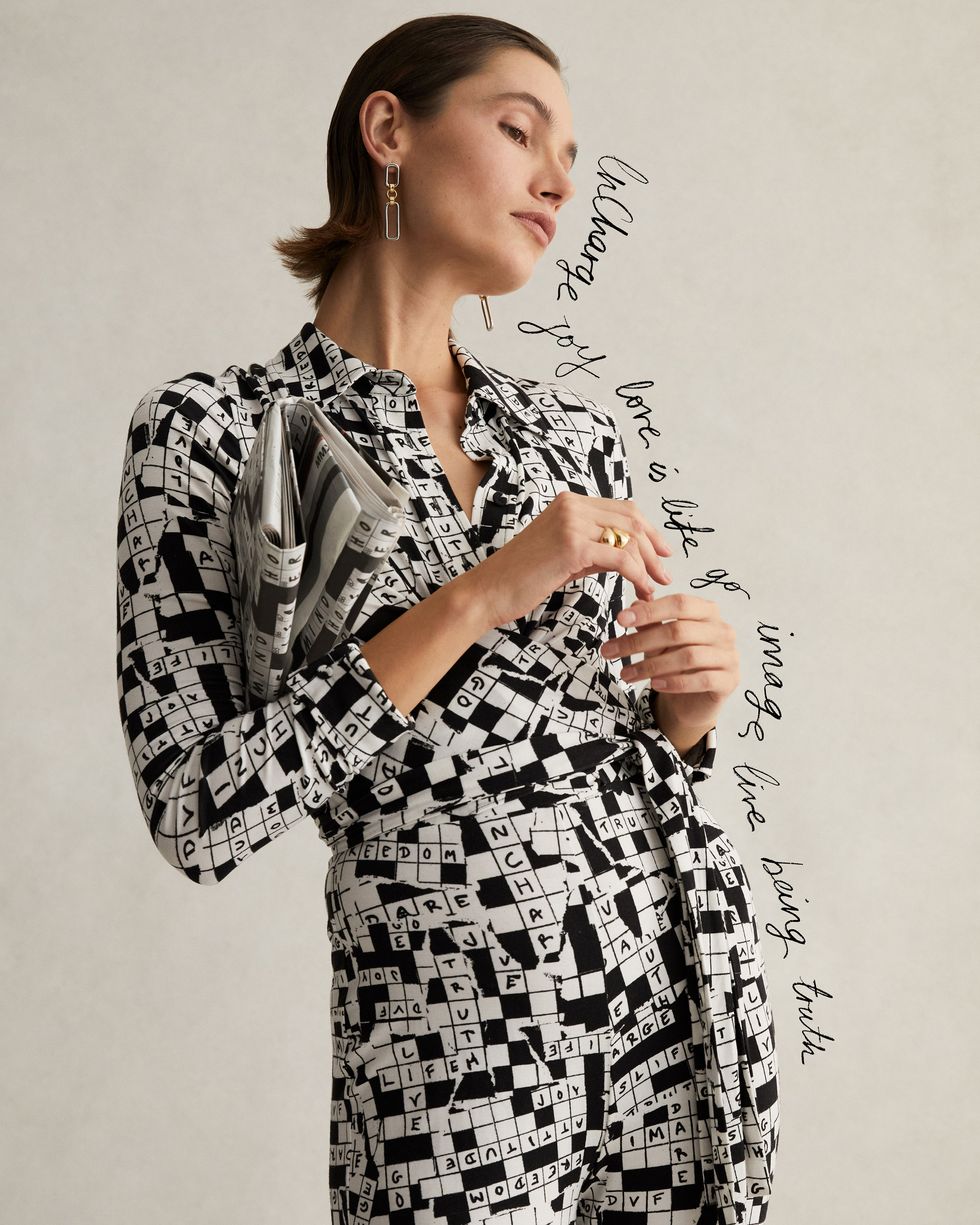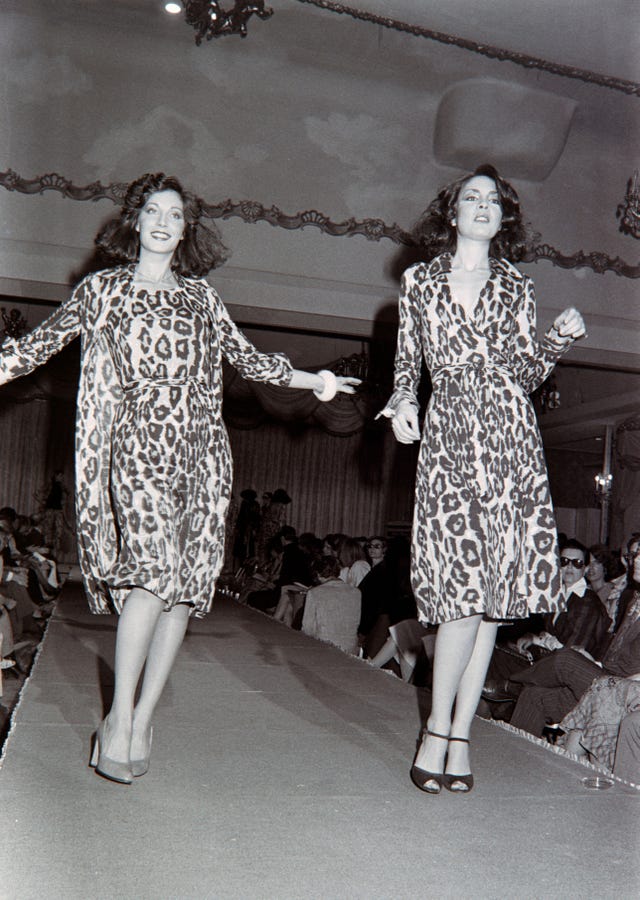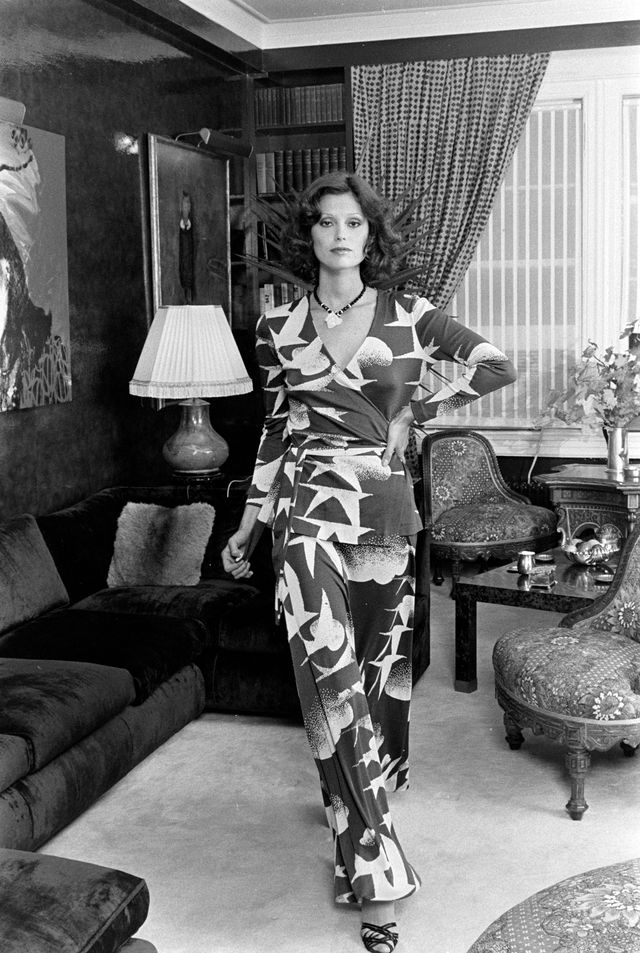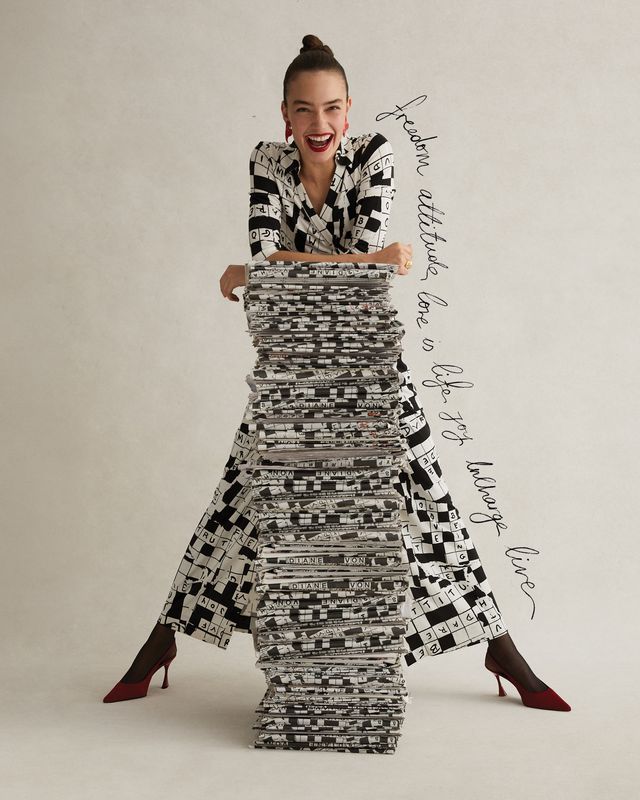Diane von Furstenberg epitomizes the phrase “the woman, the myth, the legend.” What’s even more remarkable is that she hasn’t gatekept anything. Her life’s journey has been documented in more ways than one—in books, documentaries, and exhibitions, on TV shows—and she shows no intention of slowing down. “The only thing I agreed to do this year was to celebrate the past,” von Furstenberg tells ELLE.com. “So this is going to be a big year.”
For von Furstenberg and her loyal fans, 2024 marks the 50th anniversary of the designer’s signature wrap dress, an iconic silhouette made for the unapologetic, the powerful, and the feminine, none of which are mutually exclusive, as she will be the first to tell you. With her spring 2024 iteration of the style comes a limited-edition collection, titled “Wrap 50,” dedicated to the dress’ birthday (and yes, when it’s as iconic as this, a dress can have a birthday). The capsule features a crossword puzzle print specially made for the occasion, with DVF’s personal and brand mantras filling the boxes. Other noteworthy pieces bring back the python print, a nod to the brand’s ’70s-era heritage.
Along with the 50th anniversary of the dress that made her a household name, von Furstenberg is being celebrated in other ways, too. An exhibition at the Fashion & Lace Museum in her hometown of Brussels, Belgium, which just wrapped earlier this month, looked back at her life and career, as well as the impact she had on women’s lifestyles. Woman Before Fashion, published by Rizzoli, offers a glimpse into the exhibition, while a new documentary, set to premiere on Hulu later this year, promises an outside perspective on von Furstenberg’s story. If all goes to plan, she will see it for the very first time along with the rest of us (more on that later).
For a woman notoriously in charge, von Furstenberg seems content to let others tell her story at this stage in her life—and she’s certainly got more than a few stories to tell. After all, she was just 27 years old when she created the dress that would change her life—the same age this writer is now—and I can only imagine what’s ensued since then. Except we don’t have to dream it, thanks to the designer’s candid willingness to divulge all the details. Ahead of the capsule’s release, ELLE.com got to speak with von Furstenberg about the years since the creation of the wrap dress, her best piece of advice, and how it feels to look back upon one’s own life, below.
It’s been 50 years since the birth of the wrap dress. Why do you think it’s still so iconic?
I don’t think it has happened to a dress before, and even more remarkable than that is if you go to any store, anywhere in the world, you will find some that may have had two or three generations of wearers, which is a sign of sustainability and timelessness. I was 27 years old when the wrap dress was created. First, it was a wrap top, which was inspired by the wraps that dancers wear. It immediately did really well. And then after that, the following year, I turned it into a dress, and that dress…I mean, it’s ridiculous. That dress has sold for 50 years, all the time. I cannot explain it. The quality of the fabric is great. The core of the fabric is 100 percent silk, which is an expensive fabric but is indestructible. You wear the dress, it’s not the dress that wears you. I have no problem thinking that my dresses are uniforms for the women in charge. And I’m perfectly happy making uniforms.
The two things that inspire me in life are women and nature, and with the wrap dress, I honor women and I honor nature. The secret of my prints is that they’re light. They have movement. If you see a leopard [dress], the print moves around the body, or if you see the bark of a tree, it’s not geometric; it moves. When you wear jersey in a print that moves, you automatically feel and look like a feline. For me, the beauty of a woman is three things: eye contact, smile, and body language. The wrap dress completely, totally molds you and gives you a body language that happens without you even realizing it. Somebody once said something very funny, which I think illustrates it: “It’s the dress that you can get a man in, and his mother doesn’t mind.”
One of the prints in the capsule was inspired by a New York Times crossword puzzle. What is the significance of that to you?
It started last year when, for the Met Gala, we were supposed to honor Karl Lagerfeld. So I thought, how do I honor Karl? I drew a print that had all the words that are Karl, like “Chloé” and “Chanel” and “Choupette,” his cat. I’ve always had it in the back of my mind to do a crossword print because it’s black and white, so, for the 50th anniversary, I thought, let’s do a crossword puzzle! I went to David Kwong, who is a magician. He does magic tricks, and he also does a lot of the crossword puzzles for the New York Times. I asked him to do a crossword with a scarf. All the vertical words he took from my book, Own It: The Secret to Life. It’s one word of every letter, because that book is like the dictionary. You open the envelope, you take the scarf out, and inside the envelope, you have the crossword—and the answers are on the scarf.
A recent exhibition at the Fashion & Lace Museum showcased your life’s work and career. How did it feel to have a tangible retrospective where you can look back at all the things you’ve accomplished?
I had a huge career when I was very young. And then, at some point, I didn’t. I sold the business, and I bought it back 25 years ago. I’ve had a lot of ups and downs. COVID was an opportunity to close most of my stores and really understand what this brand is about. Very often when you have a brand, you get a creative director or you get a CEO and they want to change everything, and sometimes you lose. As a person, as a brand, or as a business, the most important thing is to stay true to yourself. If you’re true to yourself, then you are free. But it’s not so easy to say “be true to yourself,” especially when you grow.
Over the pandemic, my Chinese distributor took care of operations and I wanted to make an inventory of what the brand is about, what it stands for. In doing that, I realized that it’s something that is really valuable. At the same time, I got a call from my hometown city of Brussels—they hired a new, young, hip curator named Nicolas Lor from Paris, and he wanted to do an exhibition on me, so that was very flattering. I invited him to my studio in New York, and I introduced him to the people at Rizzoli to do a book about it, which he did. Then Hulu decided to hire this Oscar-nominated director, Sharmeen Obaid-Chinoy, to do a documentary about me. I’m only the subject, and for somebody who’s always talked about herself, to have other people do it is so much more interesting.
Did you have any input at all, or did you choose not to get involved?
I could have probably, but I have not decided yet. I think I’m not even going to see the movie until it comes out. I kind of like the idea that I would go to the opening and tell people I haven’t seen it.
Why do you think it’s still important to tell your story, especially to a younger generation?
I’ve had a very big life, and I’ve started the winter of my life. I’m 77 years old, but I feel 300, because I have lived so fully, and for whatever circumstances, through my career and through my life, I have talked very openly about what I was going through. I remember the very first article [about me from] when I was 23 years old. I had just arrived in America and I would travel everywhere to sell my clothes, and all these fashion editors had this idea of the “Park Avenue Princess” and I thought, well, that’s not me. So, very early in my life I became a little provocative, but at least I was me. When I was growing up, I did not know what I wanted to do, but I knew the kind of woman I wanted to be. I wanted to be a woman in charge.
I became a woman in charge because of the wrap dress, and because it was a dress, I got to share that with women. The more I would feel confident because I was successful, the more I would share that confidence. I would go into fitting rooms and transform women. I’ve always been incredibly open about my life and my frustration and my vulnerability and my challenges, never holding back, always saying the truth. I’ve always been a feminist. I’ve always opened doors for women, that’s what I do. Looking back, I’ve always had the same mantras. Be true to yourself. Own it. When you own your imperfections, they become your assets. When you own your vulnerability, you turn it into strength.
You’ve shared so many nuggets of wisdom with other women, and I’m sure within your family, you’ve done the same. Is there anything specific that you’ve passed on to your children and grandchildren?
I wanted to make sure that they know that when I look at them, I’m very proud. My daughter did not think I was the best mother always, but looking at the results, I’m very proud of all of them: my son, my daughter, my five grandchildren. First and foremost, they’re independent. They may be slightly selfish on the outside, but just enough for me to know that nobody will take advantage of them. They are generous, they are kind, they have empathy for people. My family is definitely my best achievement.
So many amazing women have worn your dresses—and specifically the wrap dress—over the years. Is there a particular fashion moment that sticks out in your mind?
When Michelle Obama chose it for her Christmas card as the First Lady. When Amy Winehouse was pictured wearing a dress two weeks before her death. Madonna made a children’s book, and she wanted to look proper for the children, so she picked a wrap dress. Pedro Almodovar made a movie about a man who becomes a woman, and he chose a wrap dress. I have hundreds of examples…and just to make you laugh, Anne Hathaway was conceived in a wrap dress, her mother told me. Anne introduced us and her mother said, “I want to tell you something…” The funny thing is, Anne then asked her mother if it was the one with tulip print and her mother said yes. It turns out that when her mother would go out, Anne would always go and try on that dress.
The City was a pioneer of fashion reality TV. Do you still talk to anyone from the cast, specifically Olivia Palermo and Whitney Port?
Yes, I like those girls. I don’t see them very much, but Olivia sends me texts sometimes.
This interview has been edited and condensed for clarity.





